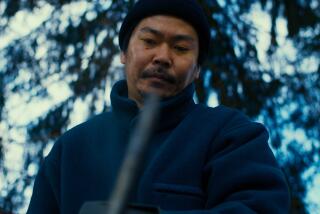Social distortions
THAT bad boy of Japanese literature, Ryu Murakami, wants Japan to embrace Western individualism -- to reject “blind” obsequiousness and instead act on personal judgment for the betterment of self and community. In Japan, where the word for “different” often means “wrong,” Western individualism gets lost in translation. But as traditional Japanese society crumbles, so do traditional conceptions of identity. Perhaps this is why Murakami’s novels so often explore the abandoned, abused and dispossessed: They represent, in microcosm, Japan’s cultural crisis. Set adrift, his characters must confront themselves as individuals. In his novel “Piercing,” now published in English, two child-abuse survivors confront how their bodies and souls have been pierced, and more crucially, how their survival strategies threaten to sever them from humanity.
“Piercing” could easily fall into cliche. Its saving grace is Murakami’s masterful use of third-person perspective. The 1994 novel opens with Kawashima Masayuki, a talented graphic designer, loving father and doting husband who is haunted by horrific childhood abuse. His mother used to pry open his eyelids and hold lighted cigarettes near them; she tied him to water pipes, stabbed his arms and legs with pencils and hit him with milk bottles. Kawashima is hovering over his sleeping infant daughter, admiring her exposed neck and chest -- “whiter and softer even than the bread” that his wife, Yoko, bakes. He feels compelled to stab his baby with an ice pick.
A lesser author might have chosen to write in the first person. But that would be too intimate, too much like a confession. Kawashima would never allow that kind of access. Yet the distance feels almost perversely close, more honest. This, after all, is how Kawashima experiences himself: After touching his baby’s cheek with the ice pick, he flees his apartment and heads to a convenience store, where he feels a familiar sensation, “as if he’d separated from his own body and was waiting a short distance away.” As a child, he used this tactic, separating from himself as his body endured beatings. Now, he decides he must stab a woman with an ice pick -- as he stabbed a girlfriend long ago -- to relieve his sick compulsion. This woman, he later decides, should be a prostitute. He will slice her Achilles tendons first, while she is alive. Given the brutality of the fantasy, one questions Kawashima’s reliability; he could be a serial murderer. But an unreliable third-person narrator? The amplified sense of alienation raises the hair on your neck.
We meet Chiaki, the prostitute, in the third person as well. Here again, we feel intimacy through distance. This sexual abuse survivor gulps down sedatives, cuts her thighs with a Swiss Army knife and has pierced her own nipple. She recalls guiding a gym teacher’s hand into her underwear once, thinking that is what men like. She hears a voice -- called “you-know-who” -- and has multiple selves. Her character borders on psychological stereotype. But as with Kawashima, the arm’s-length perspective reveals the depth of her alienation.
When Kawashima and Chiaki finally meet in a hotel room, the story slips seamlessly back and forth between each one’s perspective. But this should not be confused with an omniscient narrator: There is no outside voice, no exposition to suture these two vantages. They don’t share experiences so much as distort them through their own warped lenses.
Given that Murakami urges individualism, one wonders about this alienation -- the deadliest side effect of Western culture. But this is the point: When individualism gets lost in translation, it develops pathologically, unbridled, unchecked. There is a moment when others could have intervened -- when Chiaki screams so loudly she disturbs fellow hotel guests and a desk clerk calls to check on them. The call is only halfhearted. Kawashima and Chiaki, as usual, are left to their own devices.
After a gruesome, Tarantino-worthy battle, Chiaki feels connected to her would-be killer. Kawashima isn’t like any man she’s ever known. She senses his alienation and doesn’t want him to return to his wife. She wonders whether she secretly wants to be stabbed. And he realizes that he became one with his mother when he put the ice pick to Chiaki’s belly. But what does this connection mean? Chiaki offers a kind of solution, piercing her other nipple as he watches -- laying pain bare. Whether the cycle of abuser and abused continues remains ambiguous. But their shared alienation feels like a new survival strategy.
More to Read
Sign up for our Book Club newsletter
Get the latest news, events and more from the Los Angeles Times Book Club, and help us get L.A. reading and talking.
You may occasionally receive promotional content from the Los Angeles Times.







